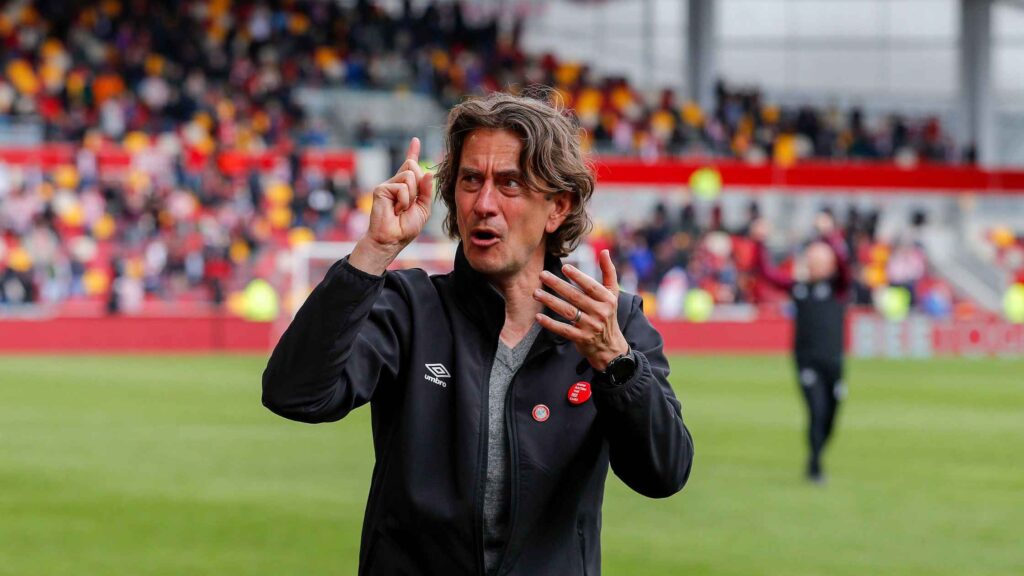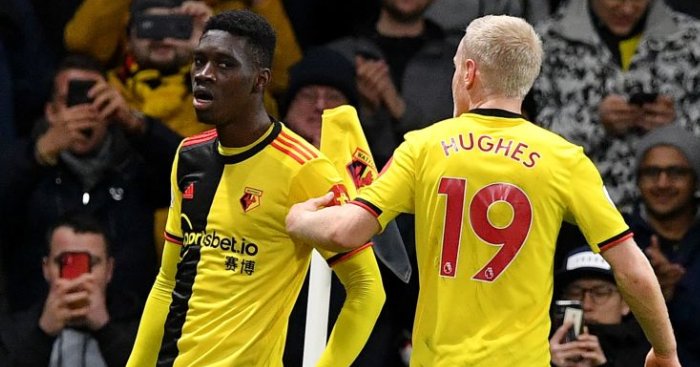Thomas Frank’s time at Brentford is the sort of thing that they should make movies about, but rarely do. There’s nothing flashy. Frank’s Brentford is a team punching above its weight, beating Premier League top clubs and doing it so often that it feels like the norm.
Here’s a look at the tactics of Thomas Frank at Brentford and what’s next for the team and manager.
Career Prior to Managing Brentford
Thomas Frank is another of the so-called “laptop managers” that grizzled tacticians like to so often complain about. Still, Frank’s also one more example of a manager who has been wonderfully successful while relying almost entirely on new methods of preparing teams.
Frank had a very short career as a footballer before becoming a youth coach in the mid-1990s in his native Denmark. This led to him being appointed as manager of Denmark’s youth team, advancing gradually from the Under-12 to the Under-19 squad.
He performed respectably with Brøndby at club level before joining Brentford as an assistant coach. Two years into his tenure, he was nominated to replace Dean Smith.
Frank guided Brentford into the Premier League on his second try, and against pessimistic predictions, the club has been safe from relegation since then.
Tactical Philosophy
Direct and with intensity. That’s the easiest way to sum up Thomas Frank’s tactical philosophy.
While the squad has changed, and even expectations have altered, it’s the way that Brentford’s approached each Premier League campaign.
Players will be encouraged to try vertical passes. Those are usually distributed through the middle. When the team attacks, Brentford’s players will try to numerically overwhelm opponents.
But Frank is rarely reckless. The team tends to defend deeply, man-to-man, but with a good amount of width.
Brentford is a team that takes its opportunities. Frank frequently talks about marginal gains. And, indeed, the manager has been known to improve players, adapt to opponents and earn just enough victories to always keep the team away from a relegation battle.
Formations and Adaptability
The team’s shape has been slightly altered from one season to another. In the 2025/26 campaign, Frank has generally opted for a 4-2-3-1.
However, in previous seasons, the starting eleven was usually set up in a 4-3-3 or a 3-4-3.
Brentford secured a number of memorable Premier League victories. The scouting team has, essentially, discovered great players. The team has defied the odds and will finish its fourth season in the top tier of English football.
Brentford in Defence
Thomas Frank’s Brentford is beloved by football neutrals, in particular, because of the large number of favourable results against the so-called Big Six Clubs.
Key to those results is the team’s defensive stability. Frank has talked about how he tends to play with five defenders against top opposition and have one of their forwards drop in between the two central midfielders. The goal is to overload in wide areas, reduce space in the centre of the pitch, and press man-to-man.
Against less mobile teams, Brentford line up in a 4-2-3-1 in the 2024/25 campaign. In the recent 4-3 victory against Manchester United, central defender Berg and Collins played almost as sweepers. Meanwhile, Kayode and Lewis-Potter advanced aggressively, stretched out the pitch and assisted inside-forwards Schade and Mbuemo to create overloads on the flanks.
Frank prefers young, hard-working defenders who can block the ball and who will have the stamina and patience to mark opponents.
But key to Brentford’s defence this season has also been the defensive midfielder Christian Nørgaard. The Dane’s ability to read the game and intercept the ball has had a massive impact on Brentford’s results.
Brentford in Transition
If we look at the table, other than Nottingham Forest, no team from the first half , completes fewer passes than Brentford. Yet, the team is in 8th place at the time of writing. How?
Frank favours direct, long passes. He views them as a calculated risk. The team simply doesn’t need all of the passes to be successful and can deal with the pressure of losing possession. Other than Fulham and Everton, Brentford attempts the highest number of long passes.
But who are those aimed at? Fast, strong finishers. Mbeumo and Wissa aren’t particularly tall players. There’s no reason to cross the ball from the flanks. They are, however, strong finishers who can depend on their physicality.
Mikkel Damsgaard is, essentially, the team’s playmaker. However, goalkeeper Mark Flekken and central defender Nathan Collins attempt even more direct passes than the Dane, and often as successfully.
Brentford in Attack
Brentford’s scouting department has covered itself in glory for unearthing strikers like Ivan Toney or Bryan Mbeumo. Both were highly efficient and neither quite fits the characteristics that a typical EPL might be looking for.
But what does Thomas Frank demand in an attacker? A reliable finisher capable of getting himself into good goal-scoring opportunities.
Brentford will rarely attempt long-range shots or crosses from deep. Frank wants to attack centrally and get as many players inside the box as possible.
Strikers, together with the wingers and midfielers will advance in unison looking to overwhelm the opposition in these central areas.
A player like Mbeumo may not be tall or technical. But he’s scored 18 goals in 36 EPL matches while taking just 2.2 shots per game. Mbeumo is very efficient. But that’s because the xG of Brentford’s chances is, usually, very high.
What’s Next for Brentford and Thomas Frank?
Thomas Franks has done wonderful things at Brentford. The team has exceeded expectations, and a place in next year’s European competitions would be the reward that they deserve.
But what next for Frank? The manager is said to be getting restless. The Danish tactician would likely leave if an offer from a top club becomes available.
Would that spell the doom of Brentford’s EPL dream? Unlikely. The club has been proven to be well run, and since it has a clear plan, a different manager might implement it successfully.
Still, there’s reason to believe that Brentford, with Frank at the helm, can continue to improve for a while yet.







